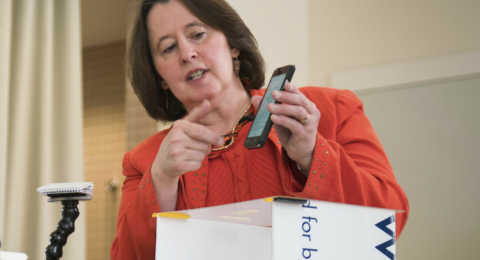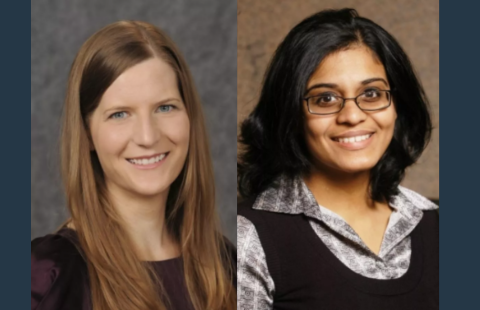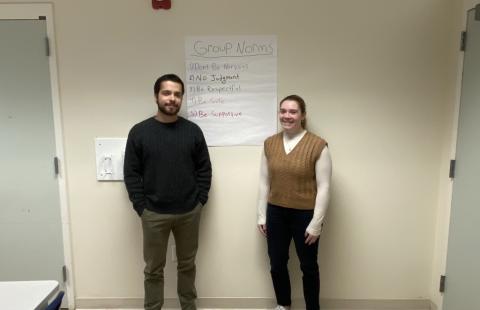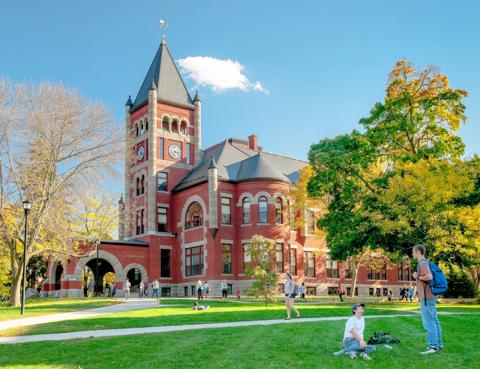WHY GET A MASTER’S DEGREE IN OCCUPATIONAL THERAPY?
A master’s degree in occupational therapy (OT) will prepare you for a career supporting people in the daily activities that are important to them. A fast-growing field, occupational therapy provides opportunities to work with people of all ages in a range of clinical settings. Our accredited master’s degree program emphasizes the understanding that engagement in everyday activities fulfills social needs and gives meaning to life, and is essential to the development, adaptation and well-being of individuals, societies and populations. You’ll learn to evaluate, provide intervention, and monitor the outcomes of patients facing a variety of illnesses, injuries and disabilities, such as autism, traumatic brain injury, stroke, substance abuse and musculoskeletal injuries.
WHY CHOOSE UNH’S OCCUPATIONAL THERAPY PROGRAM?
At UNH, you will gain valuable hands-on experience, integrating your knowledge and skills as you provide services with people in the community through academic courses and fieldwork. You will have opportunities to become involved with faculty research and scholarly projects, and you will also be supported by the educational, service and social opportunities of the Student Occupational Therapy Association on campus. Students in the B.S. OT Program enter the advanced standing M.S. program having completed many professional courses. After completing your M.S. degree, you will be eligible to sit for the National Board for Certification in Occupational Therapy certification exam to become a registered occupational therapist.
POTENTIAL CAREER AREAS
- Acute care
- Administration
- Early intervention programs
- Hand therapy clinics
- Hospitals
- In-patient rehabilitation centers
- Mental health and substance abuse programs
- Primary care settings
- School settings
- Skilled nursing facilities
From the CHHS Blog
Curriculum & Requirements
UNH students who are in the BS program in occupational therapy enter into the Advanced-Standing MS Program to complete a MS Degree in Occupational Therapy to be eligible to enter the profession of occupational therapy. Because they have completed some of the professional courses, they earn their MS Degree in Occupational Therapy in two semesters, including fieldwork.
The Occupational Therapy Master's Program is accredited by the Accreditation Council for Occupational Therapy Education (ACOTE) of the American Occupational Therapy Association (AOTA), located at 7501 Wisconsin Ave. Suite 510E, Bethesda, MD 20814. Tel. 301- 652-6611, Website: www.acoteonline.org
An entry level master’s degree in occupational therapy will prepare you to enter the profession with strong foundational skills in occupational therapy assessment and intervention in all areas of practice, with application of evidence to inform practice, and skills in leadership and advocacy, scholarly activities, and program development. You will learn to evaluate, plan and provide intervention, and monitor the outcomes of clients facing a variety of illnesses, injuries, and disabilities such as autism, traumatic brain injury, stroke, substance abuse and musculoskeletal injuries. At UNH, you will learn and apply occupational therapy principles to traditional and emerging areas of practice, in hospital and community-based settings and for individual clients and population groups.
After successfully completing all Level II fieldwork requirements and academic work, you will be awarded a Master of Science Degree in Occupational Therapy. You are then eligible to sit for the National Board Certification Examination in Occupational Therapy (NBCOT). Consistent with NBCOT expectations, you must sit for the certification examination within two years of completion of coursework and fieldwork. A felony conviction may affect your ability to sit for the NBCOT certification examination and/or obtain state licensure.
Most classes will be scheduled during weekdays during the day and into early evening. Some courses require experiential, off-campus learning in addition to required off-campus level II fieldwork experiences. The level II fieldwork experiences are full time for a total of 24 weeks and are planned collaboratively with the Academic Fieldwork Coordinator.
Admissions Information
Students who are completing the undergraduate portion of the UNH occupational therapy program declare their intent to apply to our Advanced Standing MS program by the end of their sophomore year. They take professional courses as part of their baccalaureate degree requirements enabling them to enter the MS program with Advanced Standing, with many professional courses completed. Students officially apply to the Graduate School for the Advanced Standing MS Program in the spring semester of their senior year, using an abbreviated process. Students should speak with their academic advisor regarding specific application requirements for writing a personal statement and letters of recommendation. An overall minimum grade point of B (3.0) is required for admission. Students must earn grades of B- or above in all OT courses at 700 level, with no more than 8 credits of B- or lower in OT courses (700 level or above). Students must also pass all competency (practical) exams as part of OT courses and pass all level I fieldwork requirements completed in their bachelor’s degree program.
Academic Standards and Policies
In order to be awarded a MS in Occupational Therapy from UNH, students must maintain an overall GPA of 3.0 and earn a minimum of B- in all required occupational therapy courses, and may not earn more than 8 credits of B- in OT courses (700 level or above). Students must also pass all competency (practical) exams as part of OT courses, pass all level I fieldwork requirements and receive a passing criterion score on the American Occupational Therapy Association Fieldwork Performance Evaluation for the Occupational Therapist in both 12-week Level II fieldwork experiences.
In addition to the academic standards noted above, students must meet professional behavioral standards, which are explained in detail in the OT Department Policy and Procedure Manual, provided to all occupational therapy students on the OT department's organization site on MyCourses (Canvas).
Because curriculum review and revision is undertaken annually, occupational therapy faculty work closely with students during academic advising sessions and share information about any policy and requirement changes during registration periods as well as throughout the academic year. Students are expected to take an active role in verifying expectations and requirements and should check with their departmental advisers each September for updated policies and requirements. Program requirements and policies for retention in the major are posted annually in the OT Department Policy and Procedure Manual, which is available on the OT department’s organization site on MyCourses.
Students will participate in a variety of off-campus and fieldwork experiences throughout the course of study and are covered with basic personal liability insurance through UNH for all practical components of the curriculum. Students are responsible for transportation to fieldwork sites and other off-campus learning experiences. Students are responsible for meeting the health and criminal record/background clearances established by their fieldwork sites and off-campus learning sites. Proof of immunization such as poliomyelitis, rubella, H1N1, and hepatitis B may also be required. For Level II fieldwork, health insurance and a physical examination, including a tuberculin test, are required. All fieldwork experiences are scheduled in centers approved by the Department of Occupational Therapy and with whom active Memoranda of Understanding with UNH exist.
After successfully completing all Level II fieldwork requirements and academic work, students are awarded a Master of Science Degree in Occupational Therapy. They are then eligible to sit for the National Board Certification Examination in Occupational Therapy (NBCOT). Consistent with NBCOT expectations, students must sit for the certification examination within three years of degree completion. A felony conviction may affect a graduate’s ability to sit for the NBCOT certification examination and/or obtain state licensure.
Sample Degree Plan
This sample degree plan serves as a general guide; students collaborate with their academic advisor to develop a personalized degree plan to meet their academic goals and program requirements.
Advanced-Standing M.S.
| First Year | ||
|---|---|---|
| Fall | Credits | |
| OT 845 | Administration and Management for Occupational Therapy Practice | 3 |
| OT 871 & 871L | Enabling Participation in Community Groups and Enabling Participation in Community Groups Lab | 4 |
| OT 830 & 830L | Assistive Technology for Enhancing Occupational Performance and Assistive Technology for Enhancing Occupational Performance Lab | 4 |
| OT 846 | Fieldwork and Professionalism-Level II | 1 |
| OT 893 | Special Topics (or Graduate elective course) | 3 |
| Credits | 15 | |
| Spring | ||
| OT 854 | Level II Fieldwork, I | 8 |
| OT 855 | Level II Fieldwork Discussion | 1 |
| OT 856 | Level II Fieldwork, II | 8 |
| Credits | 17 | |
| Total Credits | 32 | |
Degree Requirements
Students entering the Advanced Standing MS Program will have completed some of the professional OT courses as part of their BS degree at UNH. The required undergraduate courses are listed below, followed by the required graduate courses to earn the Master of Science Degree in Occupational Therapy.
| Code | Title | Credits |
|---|---|---|
| Undergraduate Courses | ||
| OT 620 | Medical Terminology | 2 |
| OT 710 | OT Practice and Professional Roles | 3 |
| OT 741 | Human Occupation | 4 |
| OT 685 | Psychosocial Disorders and Everyday Life | 4 |
| OT 744 | Fieldwork and Professionalism - Level 1 | 1 |
| OT 751 | Mind Body Systems/Neurologically Based Function and Dysfunction | 4 |
| OT 752 & 752L | Human Movement and Environmental Effects on Everyday Occupations and Human Movement Lab | 4 |
| OT 760 & 760L & 760R | Psychosocial Evaluation and Intervention and Psychosocial Evaluation and Intervention Lab and Psychosocial Evaluation & Intervention Recitation | 4 |
| OT 762 & 762L & 762R | Occupational Therapy Evaluation and Intervention for Children and Occupational Therapy Evaluation and Intervention for Children Lab and Occupational Therapy Evaluation and Intervention for Children Recitation | 4 |
| OT 763 & 763L & 763R | Occupational Therapy Evaluation and Intervention for Adults and Occupational Therapy Evaluation and Intervention for Adults Lab and Occupational Therapy Evaluation and Intervention for Adults Recitation | 4 |
| OT 781 | Introduction to Research and Evidence-Based Practice | 3 |
| OT 782 | Research Methods and Application | 3 |
| OT 792 | Level I Fieldwork | 1 |
| KIN 652 | Clinical Kinesiology | 4 |
| KIN 706 & KIN 707 | Neurology and Neurology Lab | 6 |
| Total Credits | 51 | |
| Code | Title | Credits |
|---|---|---|
| Graduate Courses | ||
| Advanced-standing students are required to earn 30 graduate credits, which includes 16 credits of Level II Fieldwork, in addition to 50 undergraduate credits that includes Level I Fieldwork, taken as part of the Bachelor's degree and included in undergraduate courses. | ||
| OT 845 | Administration and Management for Occupational Therapy Practice | 3 |
| OT 830 & 830L | Assistive Technology for Enhancing Occupational Performance and Assistive Technology for Enhancing Occupational Performance Lab | 4 |
| OT 846 | Fieldwork and Professionalism-Level II | 1 |
| OT 854 | Level II Fieldwork, I | 8 |
| OT 855 | Level II Fieldwork Discussion | 1 |
| OT 856 | Level II Fieldwork, II | 8 |
| OT 871 & 871L | Enabling Participation in Community Groups and Enabling Participation in Community Groups Lab | 4 |
| Electives | ||
| Select at least 3 credits of graduate-level elective course(s) | 3 | |
| Total Credits | 32 | |
| Code | Title | Credits |
|---|---|---|
| Elective Courses | ||
| OT 887 | Upper Extremity Rehabilitation and Orthotic Fabrication | 4 |
| OT 890 | Occupational Therapy and Sensory Integration | 4 |
| OT 831 | Introduction to Assistive Technology Principles | 2 |
| OT 832 | Introduction to AT Design and Fabrication | 2 |
| OT 833 | Assistive Technology for Physical Access I: Electronic Technologies | 2 |
| OT 834 | Assistive Technology for Physical Access II: Mobility, Seating, and Transportation | 2 |
| OT 835 | Assistive Technology for Communication and Cognition | 2 |
| OT 836 | Assistive Technology for Vision and Hearing | 2 |
| OT 889 | Using iPads to Support Children with Disabilities | 2 |
| OT 893 | Special Topics | 2-4 |
| OT 895 | Readings and Research in Occupational Therapy | 1-6 |
Program Learning Outcomes
Graduates of the Occupational Therapy M.S. program will:
- Demonstrate professional attitudes and behaviors in their work and interactions with clients, and others with whom they work. Our graduates will be dedicated to ethical, client-driven, OT practice, demonstrating integrity, honesty, compassion, and fairness. They will demonstrate respect for all clients with whom they work, which is grounded in an appreciation and consideration of individual priorities and life experience. Our graduates will be life-long learners, and innovative thinkers committed to ongoing professional development, and state-of-the-art, evidence-based practices. They will be able to collaborate well with other professionals as committed team players and have a solid understanding of the many roles and expertise of other professionals with whom they commonly work, along with clarity of their roles as occupational therapists. They will aspire to and be prepared to assume leadership roles in their professional lives as practitioners, researchers, advocates, and educators.
- Understand that engagement in meaningful occupations is essential to one’s health and well-being, and be prepared and committed to promote occupation-based occupational therapy practice. Our curriculum emphasizes the idea that engagement in everyday activities to fulfill social roles and give meaning to life is essential to the development, adaptation, and well being of individuals, societies and populations. Our graduates are ready and committed to apply occupation-based evaluation and intervention techniques, and to share and expand authentic occupational therapy practices.
- Be competent entry-level OT practitioners across diverse practice settings, skilled in the delivery occupation–based evaluation and intervention techniques. Our graduates will have developed critical thinking skills, and the capacity for high-level clinical reasoning preparing them to deliver client-centered, occupation-based, services in traditional and emerging practice areas. Graduates will know a variety of evaluation methods for understanding a person’s occupational history, abilities, challenges and goals. They will apply occupation-based intervention approaches, and assistive technologies to address the needs of individuals, and populations in traditional and emerging medical, education, and other community-based practice arenas.
- Apply evidence-based practices in their work. Our graduates will be skilled in identifying and interpreting relevant research and other data sources for delivering evidence-based, clinical services for promoting occupational participation and life satisfaction. Furthermore, they will have research skills for contributing to the body of knowledge that supports and advances occupational science, and occupational therapy.
- Demonstrate skills necessary to advance occupational justice so that all persons can fully participate in desired occupations. Our graduates will apply critical thinking skills, ethics, policy, and awareness of the context in which occupational therapy may be of benefit, to help advance the OT profession’s goal of meeting the occupational needs of individuals, populations and societies. Our graduates will also be able to generate new ideas to support and promote occupational justice for individuals, populations, and societies.
Professional Licensure/Certification Disclosures
The University of New Hampshire offers a number of academic programs designed to lead to professional licensure or certification in New Hampshire. However, completing a UNH degree/program does not guarantee professional licensure or certification. Eligibility may also depend on factors like years of work experience, professional examinations, passing a background check, and other criteria.
UNH does not guarantee that its professional licensure programs will satisfy the criteria of professional licensure boards in other states. Some states maintain different requirements for professional licensure or certification and requirements can change frequently. Federal regulations require the University to make public disclosure of certain information regarding professional licensure or certification programs, regardless of the modality the program is offered (i.e., in-person or online). The University provides guidance below but recommends students contact their state/territory licensing or certification board to ensure a program meets specific state/territory requirements.
Visit the Office of the Registrar's website for information about whether this program meets professional licensure requirements in your state.
Deadlines
Admissions decisions are made as applications are received.
Applications must be completed by the following deadlines in order to be reviewed for admission:
- Fall: April 1
- Spring: N/A
- Summer: N/A
- Special: N/A
Application fee: $65
Campus: Durham
New England Regional: CT RI VT
Accelerated Masters Eligible: No
New Hampshire Residents
Students claiming in-state residency must also submit a Proof of Residence Form. This form is not required to complete your application, but you will need to submit it after you are offered admission, or you will not be able to register for classes.
Transcripts
If you attended UNH or Granite State College (GSC) after September 1, 1991, and have indicated so on your online application, we will retrieve your transcript internally; this includes UNH-Durham, UNH-Manchester, UNH Non-Degree work and GSC.
If you did not attend UNH, or attended prior to September 1, 1991, then you must upload a copy (PDF) of your transcript in the application form. International transcripts must be translated into English.
If admitted, you must then request an official transcript be sent directly to our office from the Registrar's Office of each college/university attended. We accept transcripts both electronically and in hard copy:
- Electronic Transcripts: Please have your institution send the transcript directly to grad.school@unh.edu. Please note that we can only accept copies sent directly from the institution.
- Paper Transcripts: Please send hard copies of transcripts to: UNH Graduate School, Thompson Hall- 105 Main Street, Durham, NH 03824. You may request transcripts be sent to us directly from the institution or you may send them yourself as long as they remain sealed in the original university envelope.
Transcripts from all previous post-secondary institutions must be submitted and applicants must disclose any previous academic or disciplinary sanctions that resulted in their temporary or permanent separation from a previous post-secondary institution. If it is found that previous academic or disciplinary separations were not disclosed, applicants may face denial and admitted students may face dismissal from their academic program.
Letters of Recommendation: 2 Required
Recommendation letters submitted by relatives or friends, as well as letters older than one year, will not be accepted.
Personal Statement/Essay Questions
Brief essay, stating interest in continuing into the graduate program to enter the profession.
Resume
Applicants who are not in the UNH B.S. in Occupational Therapy program must submit a one-page resume that details academic, work, and related experiences.
Important Notes
All applicants are encouraged to contact programs directly to discuss program-specific application questions.
International Applicants
Prospective international students are required to submit TOEFL, IELTS, or equivalent examination scores. English Language Exams may be waived if English is your first language. If you wish to request a waiver, then please visit our Test Scores webpage for more information.







